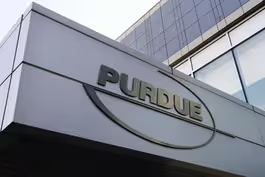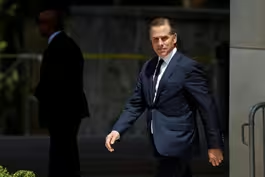
Brooks and Capehart on special counsel in Hunter Biden case
Clip: 8/11/2023 | 10m 51sVideo has Closed Captions
Brooks and Capehart on the appointment of a special counsel in the Hunter Biden case
New York Times columnist David Brooks and Washington Post associate editor Jonathan Capehart join Amna Nawaz to discuss the week in politics, including the fight for the Republican nomination and the appointment of a special counsel in the investigation of Hunter Biden.
Problems playing video? | Closed Captioning Feedback
Problems playing video? | Closed Captioning Feedback
Major corporate funding for the PBS News Hour is provided by BDO, BNSF, Consumer Cellular, American Cruise Lines, and Raymond James. Funding for the PBS NewsHour Weekend is provided by...

Brooks and Capehart on special counsel in Hunter Biden case
Clip: 8/11/2023 | 10m 51sVideo has Closed Captions
New York Times columnist David Brooks and Washington Post associate editor Jonathan Capehart join Amna Nawaz to discuss the week in politics, including the fight for the Republican nomination and the appointment of a special counsel in the investigation of Hunter Biden.
Problems playing video? | Closed Captioning Feedback
How to Watch PBS News Hour
PBS News Hour is available to stream on pbs.org and the free PBS App, available on iPhone, Apple TV, Android TV, Android smartphones, Amazon Fire TV, Amazon Fire Tablet, Roku, Samsung Smart TV, and Vizio.
Providing Support for PBS.org
Learn Moreabout PBS online sponsorshipAMNA NAWAZ: For more on the fight for the Republican nomination and the appointment of a special counsel in the investigation into the president's son, we turn to the analysis of Brooks and Capehart.
That is New York Times columnist David Brooks and Jonathan Capehart, associate editor for The Washington Post.
Welcome to you both.
Good to see you.
JONATHAN CAPEHART: Hey, Amna.
DAVID BROOKS: Good to be with you.
AMNA NAWAZ: Let's pick up where Lisa left off there.
Just want to get your reaction, Jonathan, her reporting and specifically this idea of the people she's talking to in Iowa, the two names she's hearing more often than others, Doug Burgum and Tim Scott.
What does that say to you?
JONATHAN CAPEHART: Well, before I answer your question, I want to start off the evening by saying, happy birthday, David.
AMNA NAWAZ: Happy birthday, David.
(CROSSTALK) DAVID BROOKS: World historical event.
(LAUGHTER) JONATHAN CAPEHART: Now to the question at hand.
I think it gets to something that Lisa said in her report, which is, when she talked to people about Donald Trump, that they don't like the drama.
You don't get any drama with Senator Tim Scott or with Governor Burgum.
There are a lot of people who are finding out that he's actually the governor of North Dakota and that he's a real person.
And I think that, if anything, I will be watching to see how well they do as the state fair goes on and as we start focusing in on Iowa, because I do think -- I hope.
This is what I hope, that the Republican Party and the party faithful will gravitate to leave the drama behind.
Fine, stick with the conservatives, but a conservative who actually cares about American democracy and the foundations -- foundations of our democracy.
That's what I would like to see.
And it seems to me right now that Senator Tim Scott and Governor Burgum are two -- are those two people.
AMNA NAWAZ: Is Iowa the place where one of the other candidates could break through?
DAVID BROOKS: It should be.
I mean, covering Iowa and cover the state fair used to be one of my favorite things to do in politics.
I was there.
I saw, I think it was 1999, the Last Supper carved out of butter, big life-sized statue.
That's... AMNA NAWAZ: That stuck with you, didn't it?
(LAUGHTER) DAVID BROOKS: I think Gary Bauer, who was a presidential candidate, was -- I saw him -- or something.
So, what was fantastic about Iowa, and maybe still is for all candidates but one, is that it really is small.
You're in small groups.
You're in living rooms.
You're around eight, 10 people.
I think, this year, it may not be like that.
I think Trump may just be too big.
He's barely been to the state.
He's polling super well in the state, and he may just decide, I'm not going to debate.
I'm not doing anything.
I'm just going to win.
AMNA NAWAZ: Yes.
DAVID BROOKS: And so it may be we don't get to experience the Iowa experience because Trump is just going to just bigfoot it.
AMNA NAWAZ: We talk a lot about Iowa because they're first, obviously, but do we put too much stock in Iowa?
I mean, they picked Ted Cruz in 2016, Rick Santorum in 2012, Mike Huckabee in 2008.
JONATHAN CAPEHART: Their track record on the Republican side isn't very good.
And you would think that Republicans would look and go, maybe we should shake things up, the way the Democrats did.
However, Iowa looks more like the Republican Party than Iowa looks like the Democratic Party.
And so that's why I think you see the shifts that are happening within the Democratic Party to shunt Iowa aside and no conversation at all about doing the same for Iowa.
AMNA NAWAZ: What do you make of that?
DAVID BROOKS: Pat Robertson won the Iowa caucuses many years ago, but Barack Obama did too.
AMNA NAWAZ: Yes.
DAVID BROOKS: And so if you're a candidate who's back in the field or people don't really know you, and then, suddenly, you do really well in Iowa, which you can do it with relatively little amount of money, and then you zoom up, then that makes you.
And there is a possibility -- I'm skeptical it'll happen, but if one of the non-Trump candidates zooms up, that would be earth-shaking, and that would make Iowa -- put it right back on the center of the map.
AMNA NAWAZ: I want to ask you about the breaking news we were covering earlier today about Attorney General Merrick Garland's decision to appoint a special counsel into the investigation into Hunter Biden.
That is David Weiss, who's already been investigating him, leading the investigation for the last few years, now elevated to that role.
Jonathan, the White House has been referring all questions related to this to both the Department of Justice and to Hunter Biden's personal attorneys.
This is clearly going to continue to be a political issue for Republicans.
Could it be a political problem for the president?
JONATHAN CAPEHART: I mean, it could be.
Anything is possible.
But I do think that the White House is doing the right thing.
You have got questions about Hunter Biden, don't ask us.
Go to the Justice Department.
Go to Hunter's lawyers.
The president is making it and the administration, I believe, is making it very clear: We are not interfering in this.
We have nothing to do with this.
And, in fact, if the attorney general wants to appoint a special counsel to investigate the president's son, well, so be it.
And I was struck by something also in Lisa's reporting, where folks -- she said, folks there are like, well, it's about time.
Why hasn't this happened?
AMNA NAWAZ: Yes.
JONATHAN CAPEHART: And you know why they're thinking that way?
Because they have been fed a steady diet, anti-Hunter Biden, anti-Biden family diet for months, if not years, and trying to equate what's happening with the president's son to what's happening with the former president of the United States, who now has three indictments against him for very serious crimes, two of them, and maybe another one coming next week.
So they're not equivalent, but when you get that steady diet of anti-Hunter Biden news from a particular cable network, I get why they think, what took them so long?
AMNA NAWAZ: Well, David, this is why it's worth looking at the Republican response to that appointment today.
We saw former President Trump has already issued a statement questioning the independence of David Weiss.
House Speaker Kevin McCarthy also tweeted that House Republicans will not only continue their own investigations and their own probes into Hunter Biden, but he also added this: "If Weiss negotiated the sweetheart deal that couldn't get approved, how can he be trusted as a special counsel?"
It's worth pointing out Weiss was appointed by former President Trump.
He was a -- he was confirmed by a Republican-led Senate.
Why so much mistrust?
Why this message from Republicans?
DAVID BROOKS: Well, the Republicans are mistrustful.
You can imagine, from their point of view, it's political administration indict -- or trying to defend the son of the president.
I mean, that story sort of tells itself.
I guess a couple of things about this position.
First, it can't be good news for the White House, because, a couple of weeks ago, it seemed like this thing was all going to peter out in a deal.
And now, apparently, the investigation is going to go on for some significant amount of time or else they wouldn't have done this.
So that means the story still lives.
The second thing is that I don't -- in the plea deal, it was about gun charges and tax charges.
AMNA NAWAZ: Right.
DAVID BROOKS: Those don't seem like the big deal here.
The big deal is, Hunter Biden made a lot of money telling people he was going to peddle influence.
Did he peddle influence?
And that seems to me the core question that I would like to see somebody answer.
And reporters have gone into this and they have found he received money.
They haven't found any evidence that he's peddled influence.
But I think that's what I'd like to see investigated.
AMNA NAWAZ: I want to ask you both too about your takeaways from a big special election that I don't know if many people expected it would be as big as it was in Ohio this week during the summer, in a nonelection year.
Hundreds of thousands of people turned out because abortion rights were ostensibly on the ballot.
Ohioans voted not to allow a threshold change that would have made it harder to enshrine abortion rights later in November in the state Constitution.
Jonathan, what does that turnout and this result say to you?
JONATHAN CAPEHART: It says that people are still angry.
A year ago, we were talking about the Dobbs decision by the Supreme Court that overturned Roe v. Wade, and then Kansas voted.
Kansas was the Ohio of 2022, where folks were like, whoa, ruby-red Kansas did this thing that protected abortion rights.
Then came Kentucky.
Then came Montana.
Now is Ohio, a state that Donald Trump won by eight points in the last presidential election.
What that tells me is that people are really angry and they're concerned about Republicans taking the overturning of Roe and then in various states and jurisdictions turning that -- like, doing bans on steroids, to the point where Florida has a six-week abortion ban.
There are other abortion bans that have no exceptions at all for the life of the mother, rape or incest.
And people -- and women not being able to get the reproductive health care or just plain health care that they need, and left up to a board, and we're reading stories about people being disabled or losing their lives as a result of this.
People are reading these stories.
People are seeing what's happening.
And, again, in the midterm elections, we learn that the American people are very nuanced.
They can care about inflation and gas -- high gas prices, but also erosion of their fundamental rights.
And that is still the case, as we saw in Ohio.
AMNA NAWAZ: David, it's been more than a year since Roe was overturned.
Is this going to continue to mobilize people into '24?
DAVID BROOKS: So, the turnout numbers were eye-popping, I mean, just huge turnout.
So people really did care.
Second, it wasn't just Democratic strongholds.
I think Biden won, like, five of the counties in Ohio, and this thing passed by -- in 20 of -- or more than 20 of the counties.
So it was independent voters.
And if you look at where the polling is on independent voters, they don't want a six-week ban.
They don't want any of that kind of stuff.
And so what you see in state after state is the state legislature in red states, which is supposed to be broadly representative of opinion, is doing the six-week, and -- but opinion does not want to go there.
I think 15 weeks.
And so the Republicans, if they're going to look at this politically, are going to say, look, we're way out over here.
And our people, even our people, are at somewhere around 15 weeks.
And we have got to, like, reconsider, I would think.
But if it's a life issue for you, you're not going to consider the politics.
But the political costs will be significant if they stay where they are.
AMNA NAWAZ: And do you think Republicans have a cohesive message of some kind?
Are they moving towards something?
DAVID BROOKS: Well, it's hard to -- they have taken a moral pro-life stand, and so then it's hard to scale it back once you have taken that moral -- and if you're a person who's absolutely convinced that abortion is murder, you shouldn't take a political stance.
You should just stick with your pro-life stance.
But it is -- it will probably wind up politically costly.
AMNA NAWAZ: And, Jonathan, I'm sure we can expect to see this become a more and more central part of the Biden campaign, and specifically messaging from Vice President Harris as well?
JONATHAN CAPEHART: Oh, absolutely.
Vice President Harris has been out on the road talking about this issue since the leak of the draft of the Dobbs decision went out early in 2022, so absolutely.
AMNA NAWAZ: We will continue to follow it all.
We're so grateful to have you both here.
Happy birthday, David Brooks.
DAVID BROOKS: I have had so many of those.
(LAUGHTER) DAVID BROOKS: It loses some of the fun when you get up to my numbers.
(LAUGHTER) AMNA NAWAZ: Happy birthday.
Thank you for being here, David Brooks, Jonathan Capehart.
JONATHAN CAPEHART: Thanks, Amna.
Bankruptcy plan shielding Purdue Pharma owners blocked
Video has Closed Captions
Clip: 8/11/2023 | 6m | Supreme Court blocks Purdue Pharma bankruptcy plan shielding owners from lawsuits (6m)
GOP candidates try to win over voters at the Iowa State Fair
Video has Closed Captions
Clip: 8/11/2023 | 6m 15s | GOP presidential candidates try to win over voters at the Iowa State Fair (6m 15s)
Nelson George on the 50-year evolution and legacy of hip-hop
Video has Closed Captions
Clip: 8/11/2023 | 7m 54s | Hip-hop was born 50 years ago. Nelson George discusses its evolution and legacy (7m 54s)
What special counsel appointment means for Hunter Biden case
Video has Closed Captions
Clip: 8/11/2023 | 6m 34s | What the special counsel appointment means for the Hunter Biden case (6m 34s)
Why people in Maui were caught off guard by deadly wildfires
Video has Closed Captions
Clip: 8/11/2023 | 8m 58s | Why people in Maui were caught off guard by the deadly wildfires (8m 58s)
Providing Support for PBS.org
Learn Moreabout PBS online sponsorship
- News and Public Affairs

FRONTLINE is investigative journalism that questions, explains and changes our world.

- News and Public Affairs

Amanpour and Company features conversations with leaders and decision makers.












Support for PBS provided by:
Major corporate funding for the PBS News Hour is provided by BDO, BNSF, Consumer Cellular, American Cruise Lines, and Raymond James. Funding for the PBS NewsHour Weekend is provided by...




